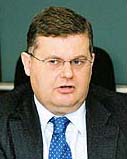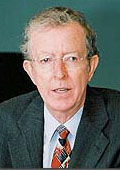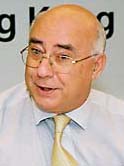A new, fast-track, graduate-entry
Juris Doctor (JD) programme and a restructured four-year
Bachelor of Laws
(LLB) programme for the 2004-05 academic year have been launched. These initiatives answer recommendations raised in a 2001 report on legal education reform in Hong Kong and cater to growing aspirations among non-law graduates to enter the legal profession.
Concern over the standard of young lawyers in Hong Kong prompted representatives from Hong Kong's Department of Justice,
Law Society and
Bar Association, CityU's
School of Law (SLW) and the University of Hong Kong to form a committee in 2000 to review legal education and training. Later, the committee issued a report that highlighted the importance of extending the three-year LLB programme to four years, to better equip budding lawyers for their future careers.
"Not only does CityU's restructured four-year LLB programme respond to the review report, it also maps out a new direction in legal education in Hong Kong, by broadening the educational experience of would be lawyers," said Professor Mike McConville, SLW Dean at a press briefing on 5 October. There will be more in-class presentations, interactive teaching and small group activities, instead of the traditional emphasis on take-home work and the closed book examination. Students will be encouraged to take part in academic exchange programmes that SLW has established with 20 renowned institutions on the mainland and overseas, to broaden their learning experience.
Generic skills building
The revamped LLB programme offers both full-time (four years) and part-time (five years) modes of study, with student intakes targeted at 52 and 70, respectively. The full-time section will continue to receive government funding while the part-time section will be offered in self-financing mode.
Mr Tony Upham, Leader of the LLB programme said that the renewed curriculum will give students a wider choice of electives, while retaining the substantive law content of the existing curriculum. Brushing up generic skills applicable to all professions, such as analysis and research, oral and written communication and the development of intellectual curiosity and professional integrity, will be emphasized. A policy of continuous assessment will be in place to ensure students acquire these skills. Professionals from the Bar Association and the Law Society of Hong Kong will be involved in the assessment.

About 75 % of the student population currently admitted to the LLB programme holds a degree in other non-law disciplines. To provide an alternative, faster route to the legal profession, SLW now offers the self-financing JD programme to those who have already completed undergraduate education, according to JD programme Leader, Dr Stephen Hall. Introduced in full-time (two years) and part-time (three and a half years) mode, the JD, the first ever offered in Hong Kong, will admit 35 and 40 students respectively.
The Juris Doctor is an internationally recognized degree issued by about 200 universities. It is well established in Common Law jurisdiction such as Australia, Canada and the US. Although the award has the word "Doctor" in its title, this is a traditional usage and is not regarded as equivalent to the PhD degree or other doctoral awards. It is a first law degree for students who are already graduates in a non-law discipline.




